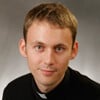What does science have to do with the meaning of life?
Adam Frank of NPR’s Science and Culture Blog, titled “13.7” after the best estimates of the universe’s age in billions of years, recently took a stab at this question (you can read the whole piece by clicking here).
“Science always asks for excellence,” Frank writes. “In reality, life always asks for excellence, too. It asks us to give our best, to be attentive, to awake to the everyday miracle that is every day.”
I couldn’t help but feel a deep resonance between what Frank wrote from a secular perspective and the writings of St. Ignatius. It is often said in Jesuit circles that “mediocrity has no place in the Ignatian worldview.” St. Ignatius wanted all of those who imitated his way of following Christ to strive for excellence in everything they did. He was confident that to engage the world and its people well would mean to come closer to God.
As we followers of Ignatius strive for excellence in our own lives we come to know better how and what the world really is – and the experience of this striving is often a mixture of understanding, wonder, and puzzled frustration.
In my own life I think this odd mixture arises because striving for excellence requires of me an openness to what is beyond. And it’s in this openness that we find meaning, or better, perhaps meaning finds us. For Frank meaning comes from understanding and appreciating nature and the human place in it. Ignatius would surely agree to this, he would just continue the journey a little bit farther in pursuit of the author of that nature.



